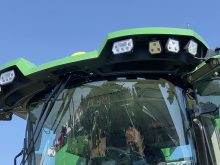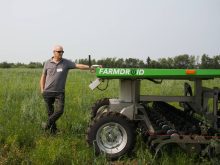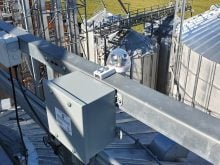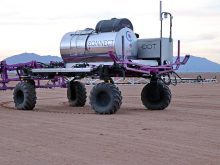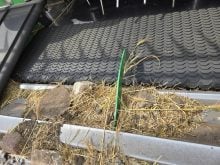Increasingly, researchers in the American Midwest are learning to work with organic systems.
Several organic researchers gathering this summer in Dickinson, North Dakota, to report on findings at the First Organic Field Day held by North Dakota State University.
The field day and conference was led by Pat Carr, agronomist at NDSU. Despite the rainy weather, nearly 200 farmers, educators, researchers, citizens and organic advocates participated.
Organics took root at NDSU in 2003, when the university dedicated some land for organic research. Organic farming was growing, but scientific research into organic farming was hard to find. NDSU planned to encourage people to think differently and to invest in “data done correctly.”
Read Also

Stacking Canada up on gene editing livestock
Canada may want to gauge how Argentina and other countries have approached gene editing in livestock and what that has meant for local innovation.
NDSU has certified its organic research acres and continue to put additional land into transition toward organic at Dickinson and at Carrington.
Carr and other researchers are focusing on strategies for successful crop transitions, from livestock operations or conventional grain farms, to organic. They are looking for methods that provide adequate amounts of nitrogen, phosphorous and potassium fertility. They are formulating novel approaches for controlling weeds that do not depend on intensive tillage. They are conducting variety trials in the most common crops.
Kathleen Delate, organic specialist from Iowa State University, spoke of her experience with long-term organic research.
After a nine-year organic management study, organic soils significantly surpassed conventional soils in terms of quality. They had higher levels of organic carbon and cycled nutrients more efficiently. Yields for organic crops were as good as, or better than conventional. Economic returns for the organics were twice as high as conventional.
Erin Silva from the University of Wisconsin talked about ecosystems within crops. The differing weed, insect pest and disease ecologies on organic and conventional land mean that vegetable varieties selected under conventional management and those selected under organic management are not the same. She found availability of organic seed to be a major limitation to organic vegetable production.
Frank Kutka, from Sustainable Agriculture Research and Education, or SARE, accompanied by Pat Frank, an organic farmer, spoke about the availability of grants and outreach programs available to American producers.
SARE grants are “to advance sustainable innovations to the whole of American agriculture.” About 11 percent of these grants go to organic projects.
Crimper-roller
Jeff Moyer discussed Rodale’s innovative crimper-roller projects. The crimper-roller was designed to reduce tillage while controlling weeds. Researchers around the U.S. have incorporated the crimper-roller in their trials.
In areas with a long enough growing season, green manures or cover crops are terminated in the same operation as the cash crop is seeded. The crimper-roller is attached to the front of the tractor. It rolls over the green manure, crimping the stems and pushing them onto the ground. Usually this is enough to kill them. Behind the tractor, the cash crop is seeded into the residue. The residue of the green manure forms a thick mulch that suppresses weeds.
Bob Quinn, an organic producer from Montana, said he sees organic farming as the answer to the crises in agriculture, energy and health.
Other speakers rounded out the day with more discussion of cover crops, weeds and local food. Connections and discussions went into the evening, bringing with them feelings of community. Although the research is in relatively early stages, the field day demonstrated the potential of organic research as well as the good will and encouragement of the community.
For further information on this event, and reports and photos of other field day events, see www.organic.usask.ca.
Co-author Jessica Valois reports on this event as part of her summer student employment at the University of Saskatchewan. Brenda Frick, Ph.D., P.Ag., is the Organic Research and Extension Co-ordinator at the University of Saskatchewan and is an affiliate of the Organic Agriculture Centre of Canada. She welcomes your comments at 306-966-4975 or via e-mail at organic@usask.ca.



